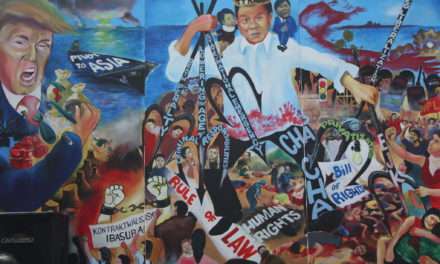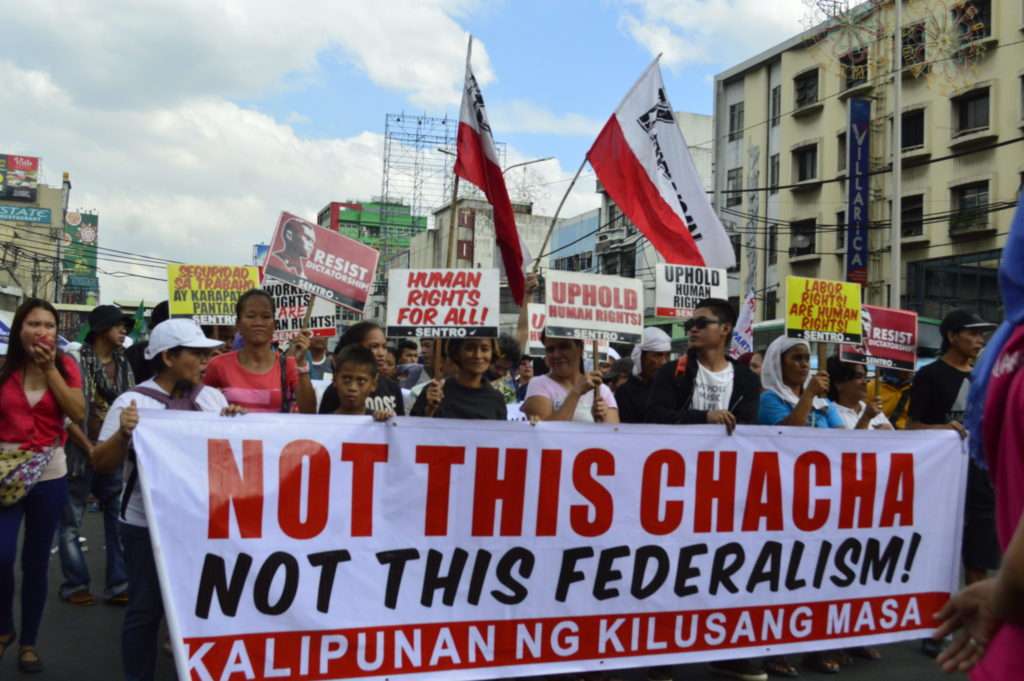
Human rights defenders march from Plaza Miranda to Bonifacio Shrine to call on the public to defend human rights, resist dictatorship and oppose Duterte’s Charter Change. One banner reads: “Not this ChaCha, not this Federalism!” Human Rights Day. 2018 December 10. Manila, Philippines. Photo by Ana Dominique Pablo
By Bianca Martinez
Since his presidential campaign in 2016, Rodrigo Duterte has promised to change the country’s form of government to federalism. Now, more than two years after he was elected President, the following proposals that seek to revise the constitution have been filed in Congress: (1) Resolution of Both Houses (RBH) No. 8; (2) PDP-Laban Federalism Institute’s (FI) draft constitution; (3) summarized proposals from the House committee on constitutional amendments; (4) Bayanihan Federalism drafted by the Consultative Committee; and (5) RBH 15, primarily authored by former President and now House Speaker Gloria Macapagal Arroyo.
The most prominent among these is Arroyo’s draft, which has been swiftly advanced for approval by its supporters in the House of Representatives. In fact, plenary debates on said proposal lasted for only three session days, despite 67 percent of Filipinos not being in favor of Charter Change (Cha-Cha) and 69 percent having little to no knowledge of the proposed federal system of government.
There are several compelling reasons to block these orchestrated efforts to revise the constitution. Essentially, the Duterte administration’s push for Cha-Cha and federalism is a populist authoritarian project that seeks to further consolidate wealth and power in the hands of the elite while appearing to cater to the interests of neglected and underdeveloped regions. This becomes clear once we deconstruct the Cha-Cha/federalism campaign and examine its aspects:
• Interests: The political actors behind revising the constitution, most notably Duterte and Arroyo, have long had ambitions to further entrench the neoliberal agenda and consolidate power and wealth in the hands of the elite and ruling class.
• Content: Being reflective of these interests, the proposed amendments essentially push the state towards having a more liberalized and globally integrated economy on the one hand, and an authoritarian government on the other.
• Context: Viewed within the larger context of a fascist administration, Duterte and Arroyo’s Cha-Cha can be regarded as the final, decisive step towards the administration’s dictatorship project.
• Propaganda: Meanwhile, the campaign’s politically motivated proponents are able to conceal these self-serving interests by giving emphasis to the problem of “Imperial Manila”—the perceived concentration of power, wealth, and resources in the region—and presenting federalism as the solution to the country’s ills.
Therefore, in order to uncover the authoritarian and neoliberal agenda driving the push for federalism through Cha-Cha, it is necessary to first examine and refute the populist ideas and approaches used as a veneer for the campaign.
State propaganda
The administration’s primary strategy for gaining widespread support for the Cha-Cha/federalism campaign is to promote an oversimplified and idealistic discourse on federalism at the national and local level. Within this discourse, federalism is touted as the solution to the country’s major problems afflicting the majority of Filipinos, including the concentration of wealth and power in Metro Manila; rural poverty and underdevelopment; and the decades-long conflict in Mindanao. However, the administration’s attempt to paint a rosy picture of federalism has been stymied by several factors, including the skepticism of many Filipinos towards Cha-Cha; the media’s exposure of several alarming provisions in the draft proposals (including Duterte’s term extension and the removal of the Vice President from the presidential line of succession); the interjection of academics and legal experts with two strong arguments against federalism (i.e. that said form of government will not work with political dynasties in power and that the administration should just strengthen the Local Government Code of 1991 in order to fully implement decentralization); the disagreement of Duterte’s economic managers with the proposed shift to federalism; and the release of Mocha Uson’s infamous “Pepedederalismo” video, which sparked public outrage not only because of its utter vulgarity but also because it raised the issue of how public funds were being squandered for the campaign.
But even as the administration failed to maintain control of the national discourse, it is using the same oversimplified, idealistic discourse with local communities at the barangay level through the state-funded federalism roadshow spearheaded by the Department of Interior and Local Government (DILG). According to reports from local communities in Cotabato, Cebu, and Davao City who attended the federalism information drive organized in their barangays, federalism was presented to them as the panacea to problems that directly and grievously affect their families and communities. Furthermore, as compared to the national discourse where the propaganda focused on the general advantages of federalism (e.g. that greater political and economic autonomy for each region will encourage rural development), the benefits are presented in a more personalized way at the local level. For instance, instead of simply saying that federalism will solve rural poverty, poor families were told that they would be able to eat three meals a day under a federal form of government. Meanwhile, barangay officials were promised that their income would increase given that regional revenues will no longer have to be shared with the national government. Therefore, the goal of the administration’s roadshow is clear: to deceive Filipinos into thinking that federalism is the solution to rural underdevelopment in order to gain public support for the campaign.
Emergence of a mass movement
The administration’s efforts to popularize federalism have been aided by the emergence of a mass movement in support of the campaign. The movement reached its climax in November 2017 when various pro-Duterte groups under the Network Revolution (NetRev) umbrella gathered in Manila on Bonifacio Day and called on the President to declare a revolutionary government and rewrite the constitution to give way to federalism. However, after the revolutionary government failed to materialize, the group quickly retreated. Even so, the pro-federalism movement persisted. Perhaps the most vocal and active group in the movement at present is the Sincere Warriors of Rodrigo Duterte – Advocating Federalism and Support Movement (SWORD-AFPSM) or “Sword”, which claims to have 300,000 members across the country. Sword has been organizing its own symposiums on federalism in different parts of Metro Manila, Laguna, Nueva Ecija, Pampanga, Bulacan, Iloilo, and Davao Oriental.
Members of this movement, however, seem to promote federalism not necessarily because they believe that said form of government can indeed solve the country’s problems, but more so because of their support for Duterte. In other words, their aid for the campaign is politically motivated insofar as they want federalism to take shape because of their desire to advance the President’s agenda. This is perhaps most strikingly reflected by the group’s explicitly stated goal to “protect and support President Duterte and the Philippine government in all aspects for the good of the nation and the Filipino people.” This clearly shows that Sword’s goal above all else is to advance the President’s interests, with their support for the Cha-Cha/federalism campaign being just one of the many ways through which they try to achieve this overarching goal.
Whether or not the administration is directly involved with Sword, the emergence of a Duterte-centric popular support base for Cha-Cha and federalism is a cause for concern. It only further simplifies the debate around federalism by reinforcing the existing dichotomous and divisive Philippine political discourse whereby supporting Duterte means supporting his policies, while going against his policies means inhibiting the administration’s promised change. Furthermore, the creation of a people’s movement only serves to give legitimacy to the neoliberal and authoritarian agenda of the Duterte administration.
Federalism, dynasties, and neoliberalism: A recipe for elite entrenchment and greater inequality
Clearly underlying the administration’s deceptive narrative for the Cha-Cha/federalism campaign is a dangerously reductionist view of Philippine political and economic institutions that idealizes the regional distribution of power and wealth as the primary solution to underdevelopment—without considering how existing institutions would factor into the proposed form of government. What this view deliberately disregards are two entrenched predatory systems that, when combined with federalism, will only further strengthen the dominant capitalistic, anti-poor, and environmentally destructive framework of development. These systems are: (1) the elite-dominated regional politics and (2) the neoliberal economy.
1. Federalism + political dynasties = elite entrenchment. Given the dominance of political dynasties in each region and the absence of an anti-dynasty law, shifting to federalism may only facilitate the consolidation of power by local elites in their respective provinces and regions. Although supporters claim that the transition to federalism will be accompanied by reform packages to curb political dynasties as well as constitutional measures to stamp out personality-based political parties, there is no guarantee that these reforms will get through deliberations in Congress sitting as a Constituent Assembly (Con-Ass), given that the majority of its current members engage in dynastic and patronage politics.
More importantly, reforming institutional, legal, electoral, and party systems is not enough to get rid of dynasties given that their power is derived not only from the weakness of these political systems but also from prevailing social, economic, and class structures. In fact, political dynasties have been successful in maintaining their dominion over national and local politics partly because of their ability to (1) strategically adapt to changing social and economic landscapes and (2) to take control of these landscapes by transforming their economic and social capital into political capital. Therefore, getting rid of or at least weakening political dynasties would necessitate the transformation not only of political institutions but also of prevailing social and economic structures from which they derive their power.
2. Federalism + neoliberalism = greater inequality and environmental destruction. In general terms, neoliberalism in the Philippines has been operationalized by the liberalization of the agricultural and industrial sectors, deregulation, privatization of public services and the commons, and massive labor export—all in the name of integrating the domestic economy with the global economy and attracting more foreign investors. These measures that have allowed elites to accumulate wealth and maintain power to the detriment of the poor and the environment will inevitably be perpetuated by elite-dominated regional governments under a federal form of government. In particular, provincial neoliberalism will most likely involve regional governments resorting to tax breaks for agricultural land to attract private investors, considering that most provinces in the country only have land and labor as factors of production, neither of which make them stand out from other provinces. The increased control of investors over agricultural land would mean the expansion of agribusiness, as well as the unrestrained conversion of agricultural land to non-agricultural uses. Ultimately, this will endanger food security and—particularly in the case of indigenous peoples, farmers, rural women, and rural workers—lead to loss of livelihood, low wages and exploitation in corporate plantations or real estate development corporations, further degradation of the environment, and displacement.
Authoritarian and neoliberal interests behind Cha-cha and federalism
Without a doubt, Duterte and Arroyo are the masterminds behind the moves to change the present constitution. However, Arroyo’s creation of a new proposal, despite Duterte’s endorsement of the Con-com draft, as well as her prioritization of the approval of RBH 15, seem to show that they are pursuing different ends. Despite their diverging paths, they are both motivated by the same ambitions: (1) to further entrench neoliberalism, which will strengthen the economic base of the elite and ruling class, thereby allowing them to (2) consolidate more power. Indeed, both have long displayed these neoliberal and authoritarian ambitions through their political and economic policies and maneuvers.
On the one hand, during Arroyo’s presidency, her administration had strategically and systematically manipulated various state institutions across all levels of the bureaucracy to plunder wealth, maintain and further consolidate power, and insulate itself from retribution. This is demonstrated, for instance, by the numerous corruption scandals that hounded the administration, which are indicative of the patronage and plunder embedded in the bureaucracy, and the use of the appointment process to put Arroyo’s cronies in power. Arroyo also notoriously maneuvered the electoral process to cheat her and her allies’ way into power. Facilitating her illicit work then was the military, which she had effectively mobilized as agents of electoral fraud. Yet despite the string of controversies, Arroyo managed to dodge retribution and maintain power because of her ability to stifle mass opposition and protests and to co-opt the Congress to shield her administration from accountability and maintain her political influence.
Meanwhile, Arroyo’s neoliberal agenda was effectuated through legislation and multilateral and bilateral treaties that sought to liberalize trade and investment in favor of foreign investors and to privatize state assets and public land. Meanwhile, laws that protect workers, women, children, and the environment were circumvented in the name of “development”. Several attempts were also made to amend the nationalistic provisions on foreign participation under the constitution, with a view to further opening up the economy to foreign investors.
On the other hand, Duterte’s authoritarian agenda is far more defined as compared to that of Arroyo. Whereas Arroyo’s goal during her presidency was to only maintain power, Duterte’s project involves absolute power grab. Walden Bello has rightfully characterized him as a “fascist original” because of the unconventional method he used to amass more power, beginning with “impunity on a massive scale—that is, the extrajudicial killing of thousands of alleged drug users and pushers—and leaving the violations of civil liberties and the grab for absolute power as mopping up operations in a political landscape devoid of significant organized opposition.”
Indeed, by successfully depicting drug users and pushers as inhuman and incurable menaces to society who induce widespread criminality and thereby negatively impact the economy and threaten peace and security, Duterte desensitized the majority of Filipinos to the systemic killing of drug users and pushers. Combining this radical campaign with his anti-elite rhetoric and his commanding personality, he was able to prop himself up as the country’s “father figure” and the bearer of real change. Strategically optimizing this identity, Duterte was able to depict all those who were against his policies and governance as hindrances to the change promised by his administration, thereby dismantling the opposition and sowing divisiveness among the people. With the opposition’s legitimacy in question, the little appreciation that the majority of Filipinos had for the importance of having a system of checks and balances in government waned even further. As such, Duterte enjoyed massive support even when he had captured the legislature (by establishing a supermajority in the House of Representatives and attempting to silence opposition in the Senate such as Leila de Lima and Antonio Trillanes III) and the judiciary (through the orchestrated ouster of Chief Justice Sereno by way of quo warranto), and when the administration repeatedly assaulted Rappler, a media institution critical of the government, with the ultimate goal of shutting it down.
Duterte has also embraced the neoliberal agenda, as embodied by the administration’s Philippine Development Plan 2017-2022. In pursuit of this, the administration has implemented policies that facilitate the liberalization of trade and investment, corporate capture of the commons, and privatization of public utilities and basic services. At the same time, the administration has hampered the passage of progressive reforms such as the proposal for a moratorium on land use conversion and banning of open-pit mining. There has also been a strong push for the Regional Comprehensive Economic Partnership (RCEP), a multilateral free trade agreement (FTA) that seeks to encourage trade and investment liberalization, strengthen intellectual property rights protection, and weaken state regulation over the economy.
Given Duterte and Arroyo’s clearly neoliberal and authoritarian interests, how exactly will Cha-Cha serve as an instrument to advance these interests? To answer this question, it is necessary to unpack the draft federal charters.
Neoliberalism and authoritarianism under the guise of federalism
A close reading of the drafts reveals that the following proposed amendments are most reflective of the elite interests behind charter change:
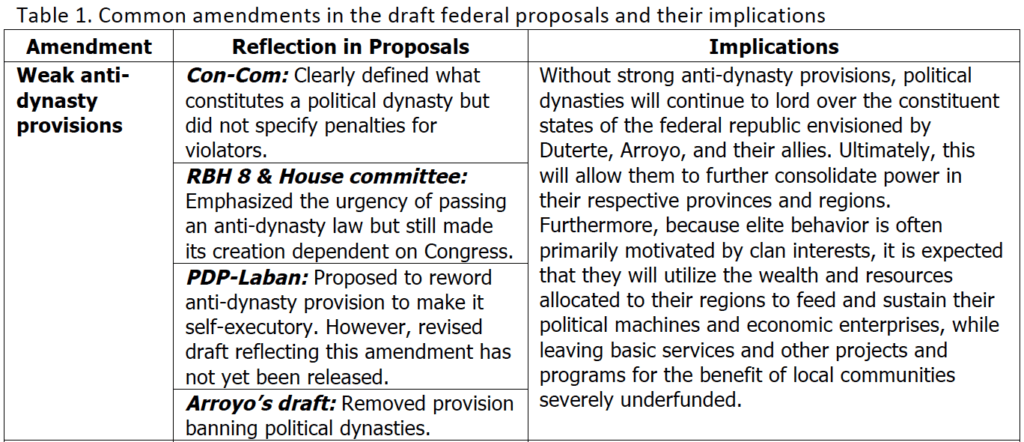
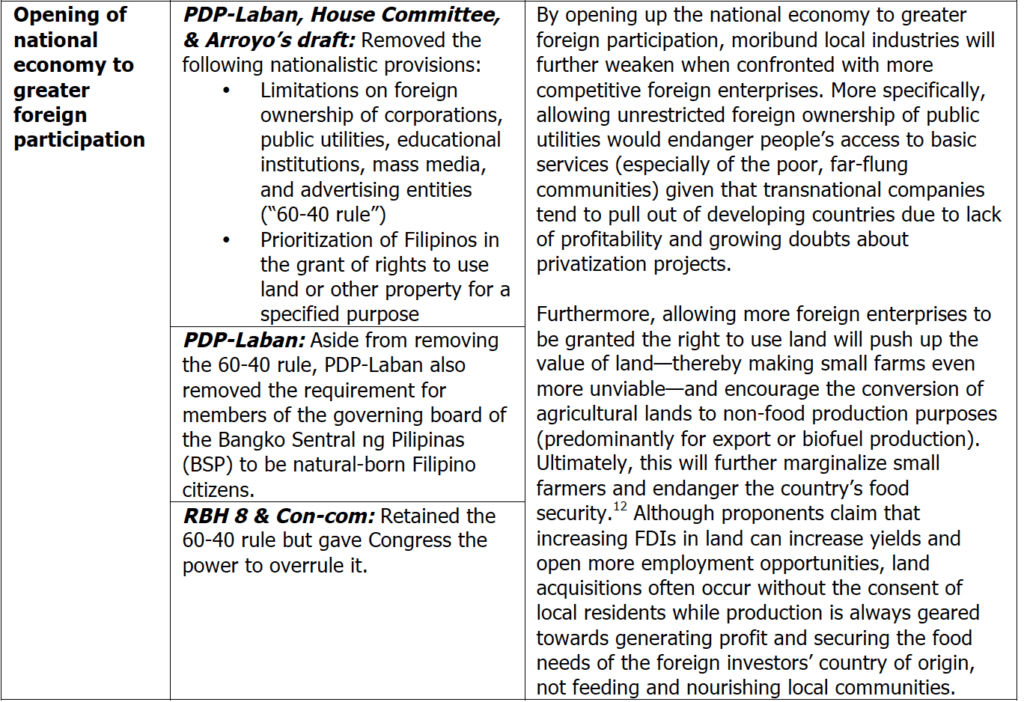

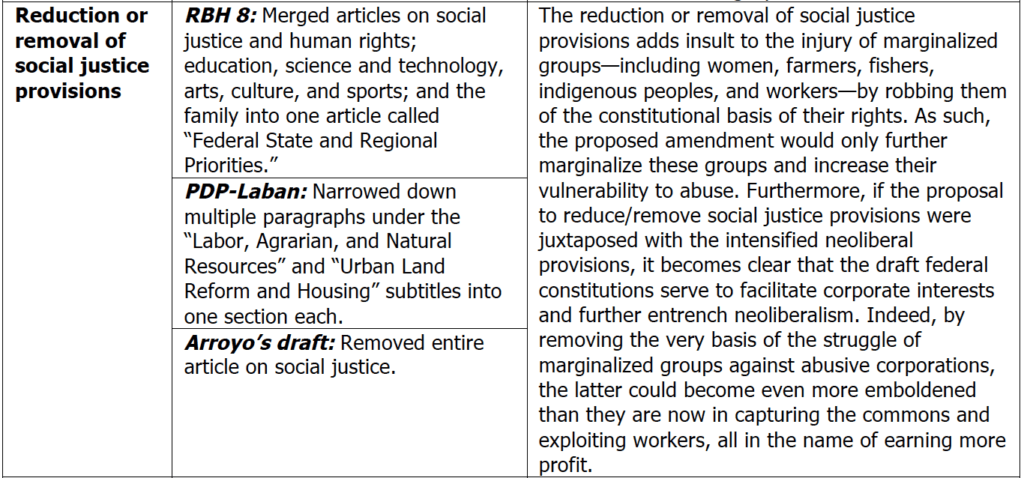
Aside from the common amendments among the draft federal charters enumerated in the matrix above, there are other equally problematic provisions found in specific drafts that are also worth noting:
• Arroyo’s draft lifted the Congressional term limits mandated by Sections 4 and 7 under Article VI of the 1987 Constitution. This would allow politicians to remain in power and perpetuate their personal and political interests.
• Interestingly, Arroyo’s draft also vests in Congress the power to create a federal state upon a petition addressed to it, and “subject to approval by a majority of the votes cast in a plebiscite in the political units affected.” If anything, this only proves that establishing a federal republic is not the actual objective of Arroyo’s move to change the constitution and is only being used to mask her real intention of advancing the neoliberal and amassing more power for the political elite.
• PDP-Laban removed the constitutional provision that limits the type of public domain land that may be classified as alienable to agricultural lands. This means that even forests, mineral lands, and national parks can be leased to private corporations. Moreover, PDP-Laban also removed the limitations on (1) the period of the lease of alienable lands to private corporations (i.e. 25 years, renewable for another 25 years) as well as on (2) the area of leasable land (1,000 hectares). Of course, for private corporations, this implies unbridled use of land for profit-generating purposes. But for farmers, fishers, indigenous peoples, and rural workers, this would lead to loss of their control over the commons and displacement.
Cha-Cha as path to dictatorship
The railroading of Cha-Cha is an indication of the increasing resourcefulness of populist authoritarians as well as their alarmingly growing control over democratic institutions. Of course, this would not have been achieved if not for Duterte’s mastery and optimization of populist rhetoric as a means to gain the confidence of the people. First, through his anti-elite rhetoric and promise of immediate and radical change, Duterte gained the support of a multiclass base. Next, using a divisive narrative that tags anyone who opposes his policies and programs as hindrances to genuine progress, he smeared all forms and shades of the opposition. And owing to his ability to maximize populist rhetoric, Duterte now enjoys the support of a heated middle class which strongly believes that purging the government of the opposition is the only way that the Duterte administration can attain real change. It is partly because of the middle class’ fanatic support for Duterte and aversion to the opposition that he was able to obtain nearly absolute control over Congress and the judiciary with considerable ease.
Now, all of Duterte’s political maneuvers are finally nearing fruition: With the administration’s near absolute control of the government, Duterte and his allies can go beyond populist rhetoric and use democratic institutions such as charter change to push for their authoritarian ambitions—but of course, not without a touch of populism in the form of federalism to mask their true political intentions. This is a cause for concern, because authoritarianism under the guise of democracy, by being discreet in its approach, would be difficult to recognize even when it is already upon us.
Ways forward
Considering that the majority of Senators have strongly disapproved of Cha-Cha and federalism and that the issue has dwindled in the national discourse, it seems likely that Cha-Cha will not proceed under the 17th Congress. However, this does not necessarily mean that the campaign is dead, as many have argued. Arroyo has already said that she is counting on the next Congress to push through with the agenda if it does not transpire under her watch. Here, we can better appreciate the importance of the upcoming 2019 midterm elections. The latest survey on the Senatorial elections released by Pulse Asia shows that 8 out of the 14 candidates who would have a statistical chance of winning the elections (if it were conducted at the same time as the survey) are in favor of or at least open to the idea of changing the constitution to pursue federalism. This is a cause for concern, as the electoral success of these candidates would mean the demise of our present constitution and a step closer towards a more neoliberal and authoritarian charter. As such, for us voters, the elections will serve as our chance to resist the neoliberal agenda and Duterte’s de facto dictatorship, as Political Science professor Carmel Abao has rightfully said.
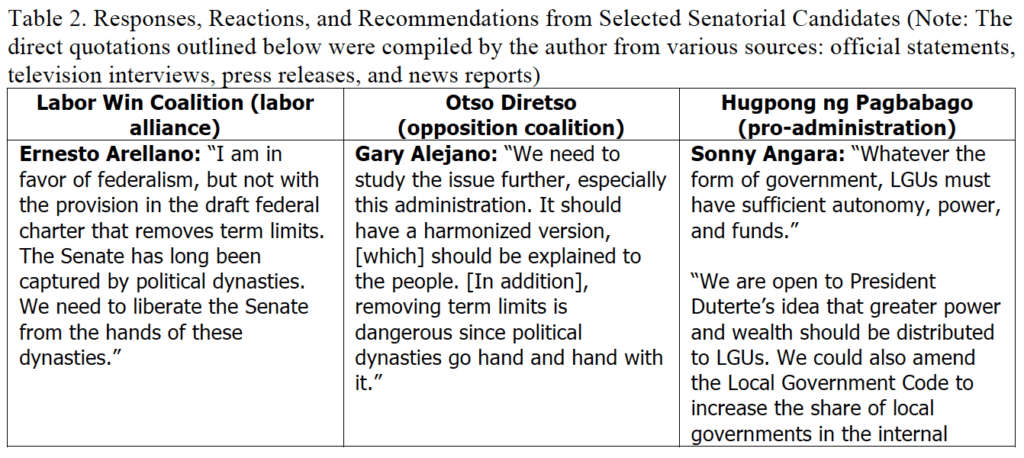
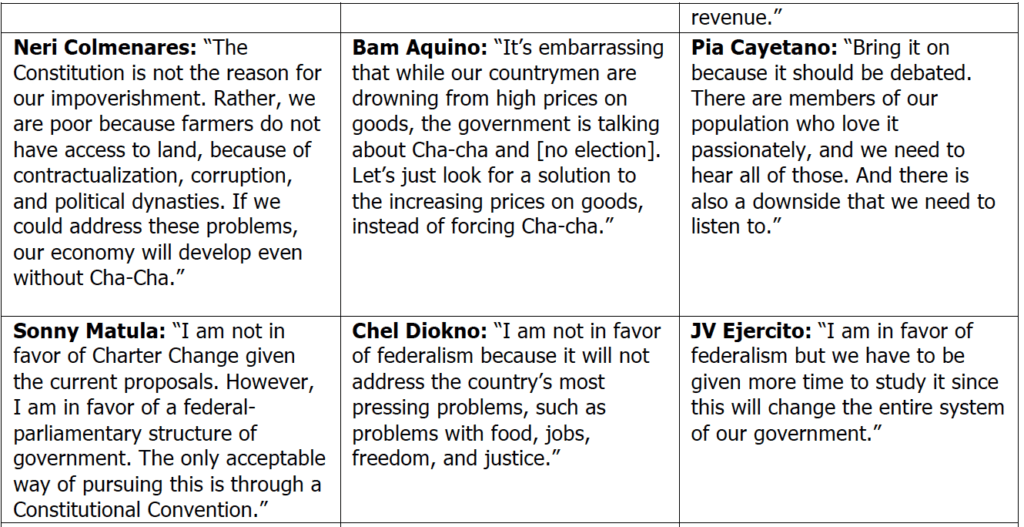
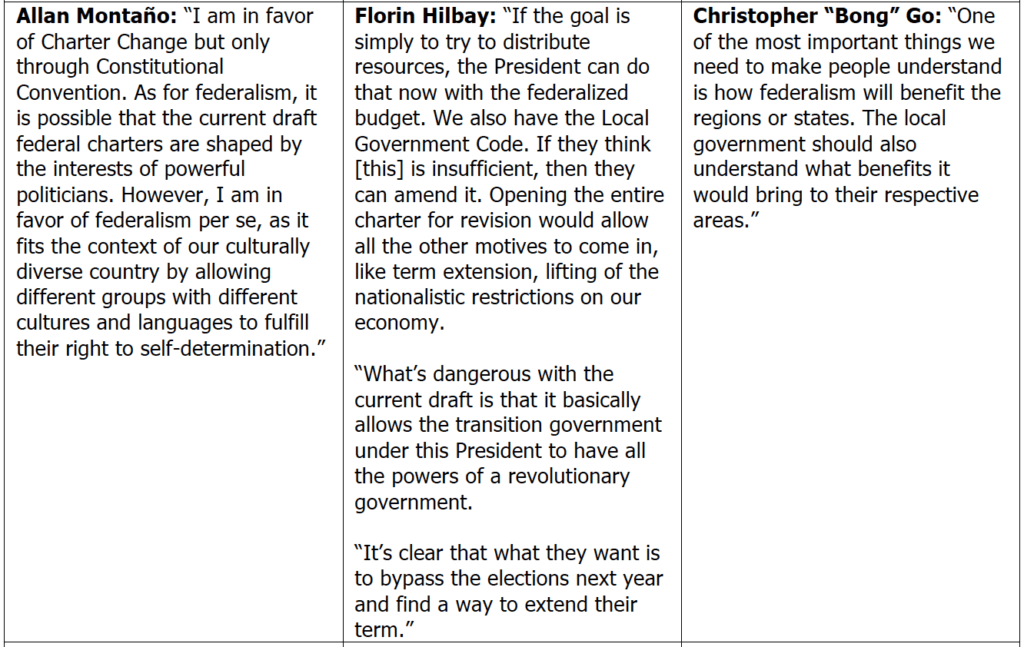

Beyond the 2019 elections, another way by which we can counter the Cha-Cha/federalism campaign in the longer term is to refute what makes it popular—that is, the underlying narrative that there is a need to shift to federalism to address Manila imperialism—and reveal its authoritarian intentions. What politically motivated supporters of the Cha-cha/federalism campaign want us to believe based on this narrative is that the main problem of the Philippines is its unitary form of government. But in reality, the most fundamental problems confronting the majority of Filipinos today—poverty, food insecurity, inflation, lack of jobs and job security, and lack of access to basic services—cannot be solved by overhauling the form of government. The problem does not lie in the unitary form of government but in the predatory rule of the elite as well as the continuing dominance of the neoliberal economic paradigm. As such, what we need to advance is not a change in form of government but a strong anti-dynasty law, a set of reforms for our electoral and party systems, and a more people-oriented and environmentally sustainable economic paradigm.
1.Maria Cepeda, “House approves draft federal constitution on 2nd reading,” Rappler, updated December 4, 2018, https://www.rappler.com/nation/218187-house-2nd-reading-draft-federal-constitution.
2.“67 percent of Filipinos against charter change – Pulse Asia,” CNN Philippines, updated July 16, 2018, http://cnnphilippines.com/news/2018/07/16/Federalism-charter-change-survey.html
3.Rambo Talabong, “Supporters ‘grant’ Duterte sole powers to write new Constitution,” Rappler, November 30, 2017, https://www.rappler.com/nation/189900-supporters-duterte-write-new-constitution-revolutionary-government-mendiola-rally.
4.Maricar Cinco, “In Laguna, federalism drive starts with storm aid,” Inquirer, September 30, 2017, https://newsinfo.inquirer.net/931865/in-laguna-federalism-drive-starts-with-storm-aid#ixzz5j5EolVMn.
5.“Activities nationwide, SWORD-AFPSM, https://sword-afpsm.com/blog/.
6.“History,” SWORD-AFPSM, https://sword-afpsm.com/.
7.According to Eduardo Araral, member of the group that created PDP-Laban’s draft federal constitution, these reforms include: (i) constitutional restrictions on political dynasties; (ii) shift to a dual executive or semi-presidential form of government; (iii) banning of political butterflies; (iv) strengthening of political parties; (v) shift to proportional representation; (vi) strengthening of constitutional bodies in the regions particularly the commissions on civil service and audit; (vii) reducing the duplication of work between the Senate and the House of Representatives; and (viii) judicial reforms including strengthening of the Sandiganbayan, appellate courts, and Ombudsman at the regional levels. See: “Evidence for and Experience with Federalism That Works,” in Debate on Federal Philippines: A Citizen’s Handbook (Quezon City: Ateneo De Manila University Press, 2017).
8.Such measures include, for instance, requiring political parties to have party whips to enforce party discipline under the PDP-Laban proposal, and requiring parties to submit its constitution and by-laws, platform, principles, policies and general program of government under the Con-com proposal.
9.Walden Bello et al., State of Fragmentation: The Philippines in Transition (Pasig: Friedrich-Ebert-Stiftung, 2014),
10. Aya Fabros, ed., Project 2010: Confronting the Legacy of the GMA Regime (Quezon City: Cor-Asia Inc., 2010),
11. Walden Bello, “Rodrigo Duterte: A Fascist Original,” CETRI, February 9, 2017, https://www.cetri.be/Rodrigo-Duterte-A-Fascist-Original?lang=fr.
12.Bello et al., State of Fragmentation, 123-124.
13.Namely: Bong Go, Sonny Angara, Pia Cayetano, Ronald “Bato” Dela Rosa, Imee Marcos, Koko Pimentel, Jinggoy Estrada, and Francis Tolentino
14. Carmel Abao, “Resist de facto dictatorship: Don’t give up the Senate in 2019,” Rappler, September 21, 2018, https://www.rappler.com/thought-leaders/212426-resist-de-facto-dictatorship-do-not-give-up-senate-2019-elections.


